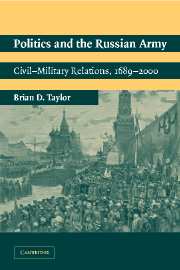Book contents
- Frontmatter
- Contents
- List of Figures
- List of Tables
- Preface
- List of Abbreviations
- Politics and the Russian Army
- Introduction
- 1 Explaining Military Intervention
- 2 Cultural Change in the Imperial Russian Army, 1689–1914
- 3 The Army and the Revolution, 1917
- 4 From Revolution to War, 1917–1941
- 5 From Victory to Stagnation, 1945–1985
- 6 Gorbachev, Perestroika, and the Collapse of the Soviet Union, 1985–1991
- 7 Yeltsin and the New Russia, 1992–2000
- 8 Organizational Culture and the Future of Russian Civil–Military Relations
- Index
1 - Explaining Military Intervention
Published online by Cambridge University Press: 16 January 2010
- Frontmatter
- Contents
- List of Figures
- List of Tables
- Preface
- List of Abbreviations
- Politics and the Russian Army
- Introduction
- 1 Explaining Military Intervention
- 2 Cultural Change in the Imperial Russian Army, 1689–1914
- 3 The Army and the Revolution, 1917
- 4 From Revolution to War, 1917–1941
- 5 From Victory to Stagnation, 1945–1985
- 6 Gorbachev, Perestroika, and the Collapse of the Soviet Union, 1985–1991
- 7 Yeltsin and the New Russia, 1992–2000
- 8 Organizational Culture and the Future of Russian Civil–Military Relations
- Index
Summary
Coups are the ultimate problem of civil–military relations. From ancient Rome to today's democratizing states, Juvenal's question – “but who is to guard the guardians themselves?” – has been of central political importance.
This chapter examines the range of possible explanations for military involvement in domestic politics. No single approach can by itself explain the hundreds of coups that have taken place over the years in a wide variety of countries – that is to ask too much of social science theory. Rather than posit a “golden bullet” theory that explains everything, the goals here are more modest. First, I map the lay of the land in this corner of the academic field. Second, I suggest how these different approaches may complement each other in a two-step model of military behavior. Before we turn to the different ways of explaining the phenomenon of military intervention, however, it is important to be clear what we are talking about.
MILITARY INVOLVEMENT IN SOVEREIGN POWER ISSUES
The notion of a military coup evokes images of soldiers with machine guns seizing television and radio transmitters and surrounding government buildings with armored vehicles. Our stylized visions of the classic coup tend to obscure the fact that the military can have a decisive influence on determining who rules the state in many different ways. Staying in the barracks sometimes can be as influential as leaving them. When conceived of in this fashion, the notion of a coup is really shorthand for a range of military behaviors, both active and passive, that can lead to a change in the executive leadership of the state.
- Type
- Chapter
- Information
- Politics and the Russian ArmyCivil-Military Relations, 1689–2000, pp. 6 - 37Publisher: Cambridge University PressPrint publication year: 2003



